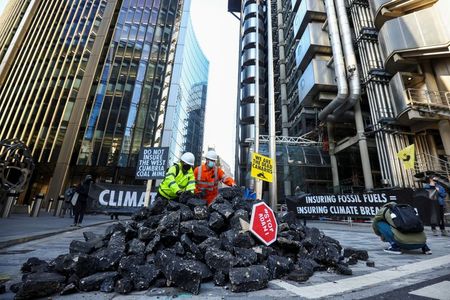Extinction Rebellion: City of London to be next climate campaign target

Environmental activists have said they will begin a fresh campaign next week in the heart of the capital’s financial district.
The fortnight-long campaign targets the City of London, which Extinction Rebellion activists blame for stoking climate change with fossil fuel investment chains.
Extinction Rebellion (XR) has regularly staged demonstrations across the UK – targeting banks and financial institutions like the Bank of England, HSBC and Lloyds, as well as energy firms like Shell and supermarket giants like Tesco.
The environmental activist group said it expected thousands of protestors to take part in the protests which will start on Monday.
“We’ll be targeting the City of London because it’s time that people understand the real contribution of the UK to this crisis,” lawyer and XR activist Tim Crosland told reporters.
“The City of London is the arch financier of the carbon economy. It supports 15 per cent of global carbon emissions. It hosts BP, Shell, Glencore, Anglo American, and Russian oil and gas companies such as Gazprom and Rosneft.”
It comes as the activist group protested against expansion plans at the UK’s largest oil refinery, Fawley Refinery in Hampshire, owned by energy giant ExxonMobil earlier today.
The action is set to coincide with a planned rail strike next week, which is expected to cause major transport disruption in the capital.
‘Code red for humanity’
Next week’s protests follow a damning report from the Intergovernmental Panel on Climate Change (IPCC) earlier this month.
The report, which UN secretary-general António Guterres called a “code red for humanity”, arrived amid a series of wildfires across Turkey, Greece, France, California and Algeria – which in turn followed severe flooding across London, Germany and China.
Chair of the Climate Crisis Advisory Group, and former government chief scientific advisor, David King said: “The most recent wildfires in Southern France are yet another reminder that extreme weather events, caused by climate change, are increasing in intensity and frequency, with devastating consequences.
“There is no safe margin remaining for the continued emission of greenhouse gases,” he added, urging that emissions need to be immediately reduced and that ways to remove greenhouse gases from the atmosphere at scale need to be found.
“While these reductions are put in place, we must buy time by researching ways to repair those parts of our climate system that are damaged, such as the melting Arctic. Governments and policy makers must take urgent action and call this what it is: a climate crisis.”
However, the government has backed a new £430m green transition loan today – the first of its kind – for energy and engineering giant Wood.
It forms part of the government’s plan to help firm’s in the pivot away from fossil fuels and towards cleaner, greener energy and practices.
Using a UK Export Finance Transition Export Development Guarantee (EDG) as part of the loan agreement, which was designed ahead of COP26, it could pave the way for more fossil fuel reliant businesses to follow suit.